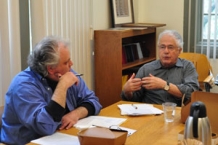Strategic Working Groups for Faculty: Collaboration and Open Exchange

In an age of ultra-high technology, how can something so simple still work so well? The Strategic Working Group (SWG) program at the Townsend Center, now in its 10th year, provides time and space for UC Berkeley faculty from diverse fields to come together to reconnect the fundamental questions of the humanistic disciplines with changing historical circumstances and emerging areas of knowledge.
And it seems to be working. In a recent interview, Maria Mavroudi (History), a participant of the SWG on “Old Things: Classical Studies and Contemporary Humanities,” described the group as “the absolute highlight of my entire intellectual experience as faculty at Berkeley.” Her positive, productive experience was the result of both the intellectual companionship and the autonomy afforded by the program: “In a career where we are constantly pressured for hectic "output" —keep talking, keep writing, keep publishing— and almost no quiet time to learn for ourselves anything substantial (which I view as the only safety valve preventing one from becoming superficial under this kind of pressure), this was the first (and so far only) time that I felt the university provided an opportunity, within an institutional setting, to receive and honestly reflect on ideas that could feed my own in the future. "
“Old Things: Classical Studies and Contemporary Humanities” was convened by Ramona Nadaff and Daniel Boyarin in 2009-10 with the goal of examining the relationship between pre-modern texts and the post-modern world in light of developments in twentieth-century classical studies and the current crisis in the humanities. Their work eventually led to a Course Thread for the undergraduates on the same topic. Defining their collaboration as a process of mutual influence, Nadaff, in an interview for a video commemorating the Townsend Center’s 25th anniversary, describes how each participant’s specialty activated the knowledge central to everyone: “We started with a very close reading of Thucydides, and then from there each person would have a response in terms of their own work. One colleague brought in Nietzsche where we discussed the question of history. We had another archeologist who brought in artifacts.”
Indeed, the program does not foreground specific ends but enables the faculty’s own initiatives. Collaborative reading practice inspired extraordinary development in scholarship and pedagogy when the “Critical Theory” Strategic Working Group in 2004 culminated in what is now a thriving Designated Emphasis in Critical Theory for graduate students. The curriculum “fell into place,” recalls Wendy Brown, when the strategic working group provided a space for a diverse group of faculty “just to think for a semester about what critical theory could be as a program at Berkeley.”
Past strategic groups have worked to test how different forms of knowledge such as life sciences and anthropology can be put together; flesh out foundational concepts like “value” or “religion;” track the historical formations of critical lenses like “new media” or “inflections;” and consider ways that the humanities intervene concretely into the pursuit of justice, to name just a few examples. Their range and ambition are matched only by their curiosity and openness to exchange.
Faculty Applications for participation in the 2013-14 Strategic Working Group on Law and Humanities are due Friday, March 1. Review fellowship details and application guidelines here.